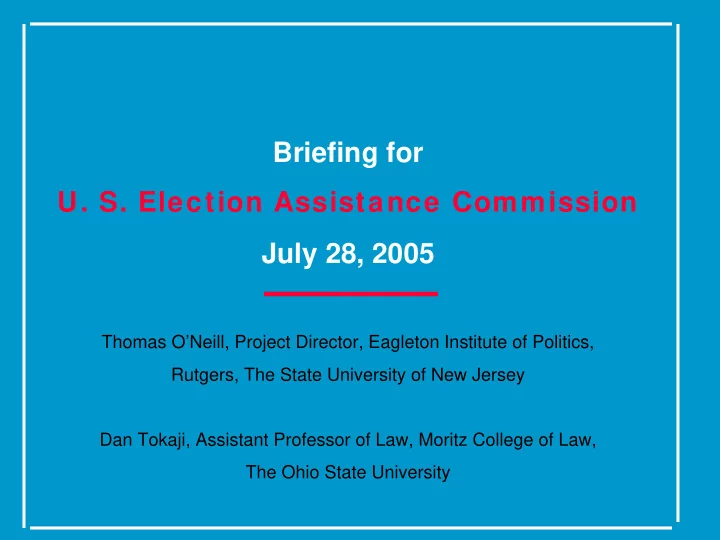

Briefing for U. S. Election Assistance Commission July 28, 2005 Thomas O’Neill, Project Director, Eagleton Institute of Politics, Rutgers, The State University of New Jersey Dan Tokaji, Assistant Professor of Law, Moritz College of Law, The Ohio State University
Research Assistance on Provisional Voting Voter Identification Procedures
EFFECTIVE ADMINISTRATION BALANCING COMPETING OBJECTIVES BALLOT VOTER SECURITY ACCESS
Key Questions 1. How did the states prepare for the onset of the HAVA provisional ballot requirement? Review of statutes and regulations State narratives 2. How did this vary between states that had previously had some form of provisional ballot and those that did not? Survey of local election officials State narratives
3. How did litigation affect implementation? Survey of case law and regulations State narratives 4. How effective was provisional voting in enfranchising qualified voters? Survey of litigation State narratives Survey of local election officials
5. Did states and local processes provide for consistent counting of provisional ballots? State narratives Survey of litigation Survey of local election officials 6. Did local election officials have a clear understanding of how to implement provisional voting? Survey of local election officials State narratives
OUTREACH American Enterprise Institute Brennan Center for Justice at NYU School of Law Center for Digital Government The Century Foundation The Constitution Project DEMOS-USA The Election Center Election Reform Information Project Leadership Conference on Civil Rights League of Women Voters National Association of Secretaries of State National Association of State Election Directors People for the American Way + Other organizations after consultation with U.S.E.A.C.
PROVISIONAL VOTING Key Research Deliverables 1. Summary of case law on Provisional Voting 2. Compendium of states’ legislation, regulations, and litigation. 3. Analysis of how provisional voting was implemented around the country, which will be critiqued by Peer Review Group. 4. Description of alternatives to existing practices and procedures
VOTER IDENTIFICATION Key Research Deliverables 1. Indexed database of major articles on Voter ID Requirements 2. Summary of case law 3. Compendium of states’ legislation, procedures, and litigation. 4. Analysis of voter participation and vote fraud under various Voter ID regimes to be reviewed by Peer Review Group. 5. Alternative approaches
Hearings on Guidance Documents Consult with EAC to identify locations and venues Hearings to take place 30 days after publication Deliverables Transcript Summary and analysis of comments Recommend revisions to GD based on hearing results and discuss with EAC Deliver final Guidance Document to EAC
Project Status PROVISIONAL VOTING Task 3.4: Collect and analyze state legislation, administrative procedures, and court cases. Understand the disparities and similarities of how provisional voting was implemented around the country. •Initial legal, regulatory, and case law research for 44 states, is complete. Completion for all states by August 1. •Compiling narrative description of experience in each state. Completion in first week in August. •Surveying 400 county election officials actual practice in administering provisional voting. Completion mid-August.
Project Status VOTER IDENTIFICATION Task 3.10: Legislation, regulations, and litigation •Initial research complete (and statutes compiled) for 45 states. Questions answered include “W ho is required to present ID”, “Types of ID required”, and “Consequences of having no ID ”. Complete mid- September. •Collecting information on the voter id debate in the states to monitor possible secondary effects of HAVA and to suggest alternative approaches. Complete first week of August. •Statistical analysis to gauge the effect of a state’s voter ID regime on turnout, especially turnout by minority and elderly voters. Complete late August.
Briefing for U. S. Election Assistance Commission July 28, 2005 Thomas O’Neill, Project Director, Eagleton Institute of Politics, Rutgers, The State University of New Jersey Dan Tokaji, Assistant Professor of Law, Moritz College of Law, The Ohio State University
Recommend
More recommend